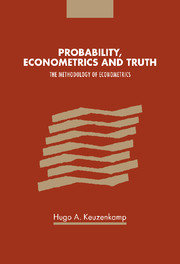Book contents
- Frontmatter
- Contents
- Introduction
- 1 The philosophy of induction
- 2 Probability and indifference
- Intermezzo: a formal scheme of reference
- 3 Relative frequency and induction
- 4 Probability and belief
- 5 The theory of simplicity
- 6 From probability to econometrics
- 7 Econometric modelling
- 8 In search of homogeneity
- 9 Positivism and the aims of econometrics
- 10 Probability, econometrics and truth
- Personalia
- References
- Name Index
- Subject Index
1 - The philosophy of induction
Published online by Cambridge University Press: 22 September 2009
- Frontmatter
- Contents
- Introduction
- 1 The philosophy of induction
- 2 Probability and indifference
- Intermezzo: a formal scheme of reference
- 3 Relative frequency and induction
- 4 Probability and belief
- 5 The theory of simplicity
- 6 From probability to econometrics
- 7 Econometric modelling
- 8 In search of homogeneity
- 9 Positivism and the aims of econometrics
- 10 Probability, econometrics and truth
- Personalia
- References
- Name Index
- Subject Index
Summary
[S]ome other scientists are liable to say that a hypothesis is definitely proved by observation, which is certainly a logical fallacy; most statisticians appear to regard observations as a basis for possibly rejecting hypotheses, but in no case for supporting them. The latter attitude, if adopted consistently, would reduce all inductive inference to guesswork.
Harold Jeffreys ([1939] 1961, p. ix)Introduction
Occasionally, the aspirations of econometrics are frustrated by technical difficulties which lead to increasing technical sophistication. More often, however, deeper problems hamper econometrics. These are the problems of scientific inference – the logical, cognitive and empirical limitations to induction. There is an escapist tendency in econometrics, which is to seek salvation in higher technical sophistication and to avoid deeper philosophical problems. This is reflected by the erosion of an early foothold of empirical econometrics, Econometrica. The share of empirical papers has declined from a third in the first (1933) volume to a fifth in recent volumes. This is not because most empirical values for economic variables or parameters have been settled. Despite the ‘econometric revolution’, there is no well established numerical value for the price elasticity of bananas. If Econometrica were to publish an issue with well established econometric facts, it might be very thin indeed. The factual knowledge of the economy remains far from perfect, as are the ability to predict its performance, and the understanding of its underlying processes. Basic economic phenomena, such as the consumption and saving patterns of agents, remain enigmatic.
- Type
- Chapter
- Information
- Probability, Econometrics and TruthThe Methodology of Econometrics, pp. 1 - 20Publisher: Cambridge University PressPrint publication year: 2000



